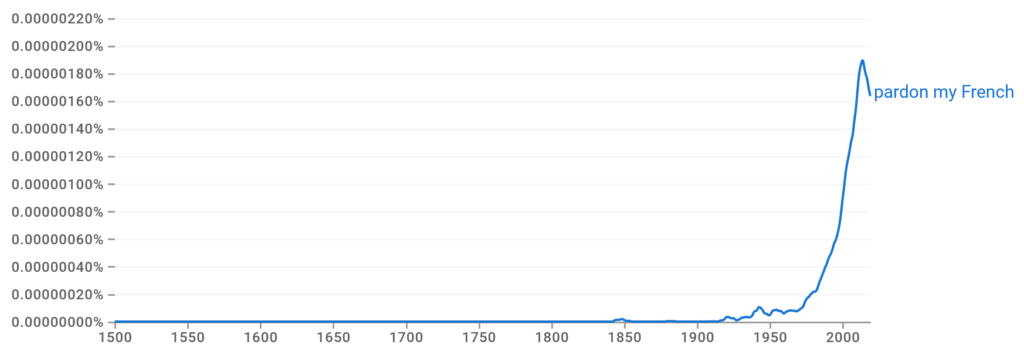Pardon my French is an idiom used to apologize or excuse oneself for using profanity, vulgar language, or inappropriate expressions. It is often employed humorously to acknowledge that the speaker is about to use or has just used language that may be considered offensive or impolite.
Idioms, like pardon my French, are non-literal expressions common in the English language. They play a crucial role by encapsulating cultural nuances and social conventions, contributing to language richness.
My quick guide will break down the meaning of pardon my French, its origin, how it’s used, and the various contexts in which it appears. I’ll also provide tips on using this idiom and its many related terms. Ready to start? Let’s go!

What Does the Idiom Pardon My French Mean?
Pardon my French is an idiom that serves as a humorous or lighthearted apology for using language that might be considered impolite or offensive. It’s a way of acknowledging the use of strong or vulgar expressions, often with a touch of humor, without a direct connection to the French language.
Merriam-Webster also states that the idiom pardon my French is “used to apologize for using offensive language.” Moreover, the Cambridge Dictionary explains that the idiom is “said when you are pretending to be sorry for using a word that may be considered offensive.”
Pro tip: When using this idiom, always capitalize the word French.
Literal Meaning vs. Figurative Meaning
The literal meaning of pardon my French might imply seeking forgiveness for speaking in French or for attempting to speak French as a second language but doing a bad job of it. However, figuratively, it’s a tongue-in-cheek way of excusing oneself for using vulgar or offensive swear words or expressions.
Variations of the Idiom
- “Excuse my French, but that’s a load of rubbish!”
- “Excuse my language, but I have to vent about this frustrating situation.”
- “Don’t mind my French, but that guy’s a total jerk!”
How Is Pardon My French Commonly Used in Context?
Pardon my French is a versatile idiom with various applications in everyday conversation. Understanding the different ways it can be employed and adopting effective usage tips can enhance your communication skills.
The following sections explore the diverse contexts where this idiom is commonly employed, provide tips for using it effectively, and offer examples to illustrate its versatile usage. Explore the sections below to grasp the nuances of incorporating pardon my French into your language repertoire.
What Are the Different Ways to Use Pardon My French?
These examples showcase the versatility of pardon my French in different conversational contexts.
- Casual apology: “Pardon my French, but that movie was terrible.”
- Expressing frustration: “Pardon my French, but I can’t believe I missed the train again.”
- Softening criticism: “Pardon my French, but I think your idea needs some improvement.”
- Humorous disclaimer: “Pardon my French, but these new rules are a bit confusing, if you ask me.”
- Acknowledging strong emotions: “Pardon my French, but I’m really upset about what happened.”
What Are Some Tips for Using Pardon My French Effectively?
- Timing is key: Use pardon my French sparingly, and consider the appropriateness of the situation.
- Context matters: Gauge the formality of the setting; the idiom may be more suitable in casual conversations.
- Humor helps: Employ the phrase with a touch of humor to lighten the impact of strong language.
- Apologize with grace: If needed, follow up with a genuine apology to ensure your message is well-received.
- Know your audience: Be mindful of who you’re talking to; some may appreciate the idiom more than others.
Where Can You Find Examples of Pardon My French?
In popular culture, you can find the idiom used in movies and books to introduce a character’s frank or unfiltered opinion. For example, the phrase is used to humorously preface a candid remark in the film Bridget Jones’s Diary.
In one of my favorite TV shows, The Walking Dead, Negan says,
“Well, pardon me young man, excuse the s**t out of my goddamn French, but did you just threaten me?”
What Is the Origin of the Idiom Pardon My French?

The idiom pardon my French traces its origin back to the 1830s when it was initially used in England. Initially, the phrase was employed quite literally—to seek forgiveness for using a French word, particularly when addressing someone who might not have had the social standing to understand the language.
Over time, this linguistic apology evolved into a more colloquial expression, transforming into an acknowledgment and apology for using swear words.
This shift coincided with the historical context of heightened tension between the French and English during the Napoleonic Wars in the early 1800s. While once possibly viewed as insulting to the French, today, only the most sensitive individuals would consider these idioms offensive.
An early instance of it in print can be found in The Lady’s Magazine during the early 1800s, which said,
“Bless me, how fat you are grown! – absolutely as round as a ball: – you will soon be as enbon-point (excuse my French) as your poor dear father, the major.”
How Did the Idiom Evolve Over Time?
Over the years, the phrase transitioned from a literal apology for using French to a figurative excuse for using swear words, reflecting the playful and evolving nature of language.
What Are Some Related Terms to Pardon My French?
Here are some great alternatives you can use instead of pardon my French and a few opposite terms and phrases to consider.

Synonyms
- Forgive my words
- Sorry for the language
- Mind my words
- Sorry for the explicitness
- Apologies for being blunt
Antonyms
- Speaking plainly
- Talking straightforwardly
- Tempering my speech
- Keeping it clean
- Watch my words
Pardon My French: Test Your Knowledge!
Choose the correct answer.
What Have We Learned About Pardon My French?
Pardon my French offers a fascinating glimpse into the niceties of language and social etiquette. Originally an apology for using French terms, it’s evolved into a light-hearted disclaimer for swearing. We covered its true meaning, origin, variations, and different ways it could be used.
Remember, while it adds color to a conversation, its use should be context-appropriate and sensitive to the audience. Be sure to read my other guides on popular idioms and become a pro!
